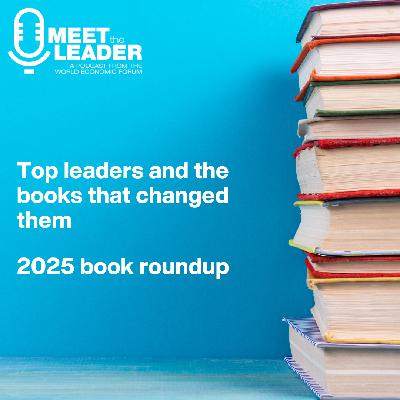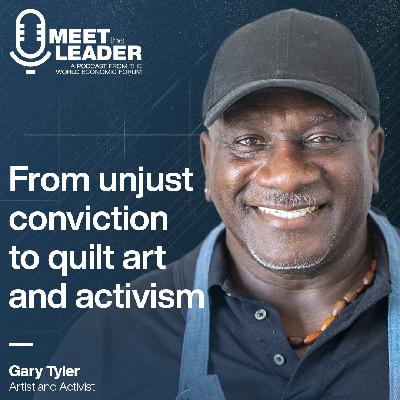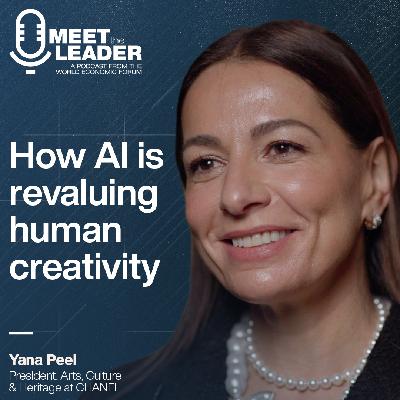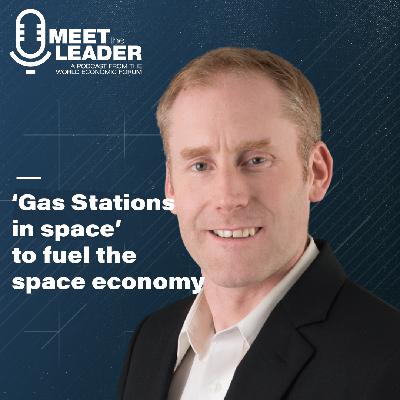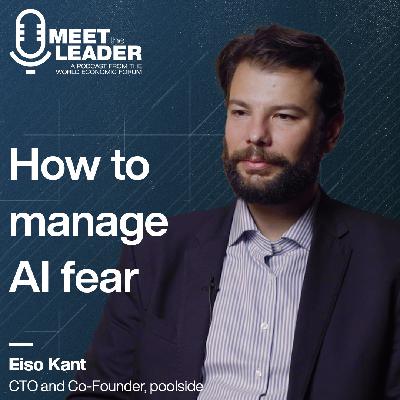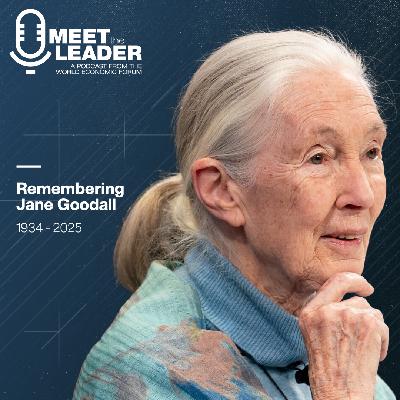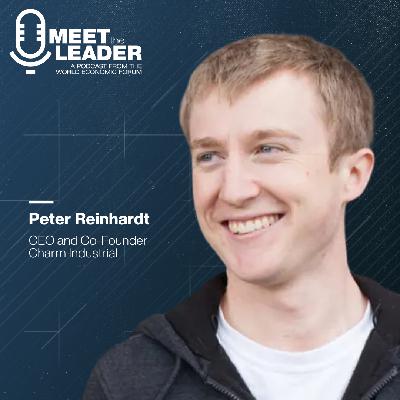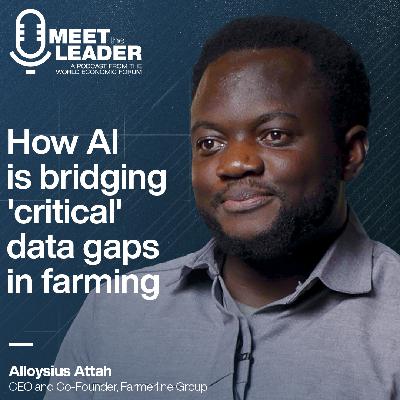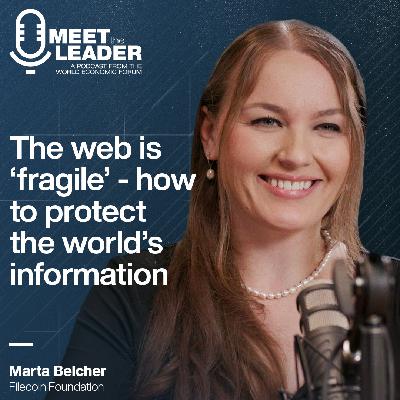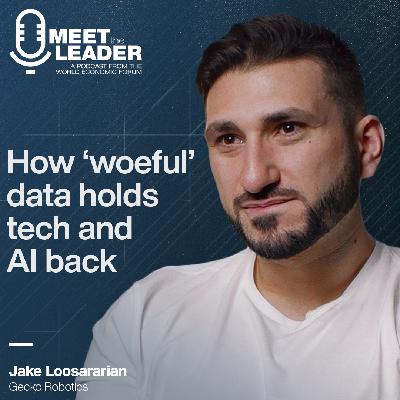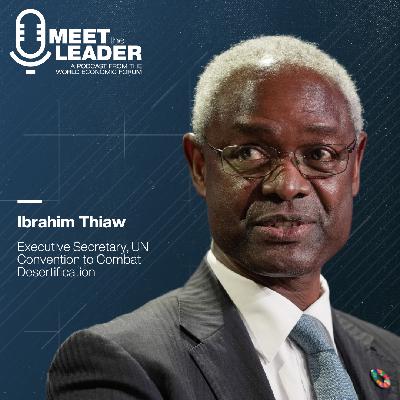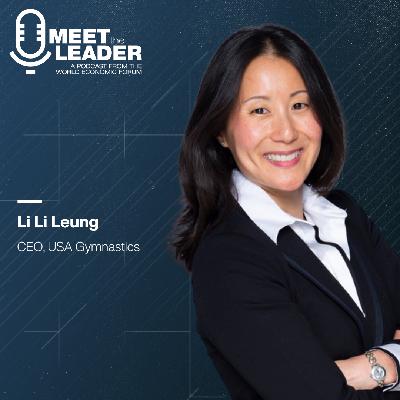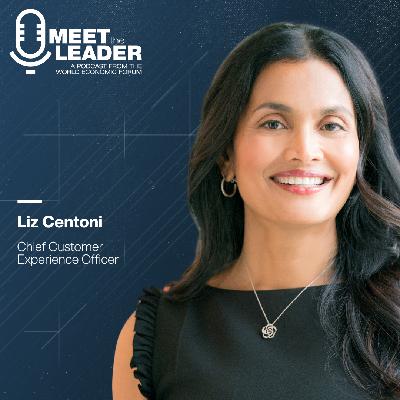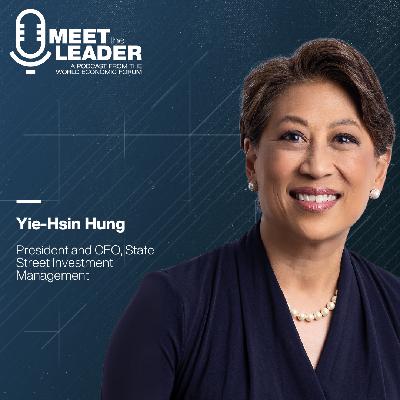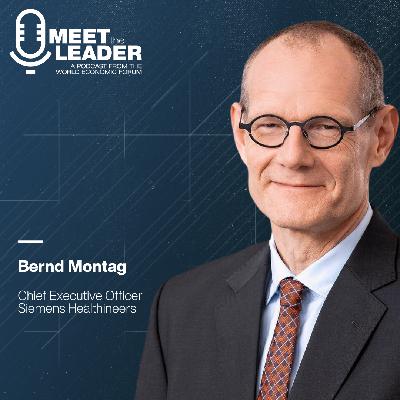Discover Meet The Leader
Meet The Leader

Meet The Leader
Author: World Economic Forum
Subscribed: 177Played: 2,979Subscribe
Share
© World Economic Forum
Description
In these one-on-one conversations, host Linda Lacina interviews the world's top leaders, change-makers and experts on the solutions they're building to tackle the world's biggest challenges, the habits they can't work without, and their lessons learned, all from the World Economic Forum
185 Episodes
Reverse
What do startup founders, CEOs of multinationals and Harvard professors have in common? They can all name a book that has changed how they live, think or lead. In this annual roundup episode, look for your new read (or a gift for that hard-to-buy for person on your list) from the recommendations of the world's top thinkers and change makers. Our annual books roundup collects books that have transformed how some of the top global leaders manage teams, get inspired, and make things happen. This year's recommendations include fresh takes on classic business books, histories, time-honored works of literature, and new favorites that can change how you build and lead. About this episode: Transcript: https://www.weforum.org/podcasts/meet-the-leader/episodes/2025-book-recommendations-leaders Books and leaders in this episode: Books to deepen your understanding of the world -Angela Odour Lungati, Ushahidi Book: The Power of Geography, Tim Marshall -Sherry Madera ,CEO, CDP Book: Pricing the Priceless: The Financial Transformation to Value the Planet, Solve the Climate Crisis, and Protect Our Most Precious Assets, Paula DiPerna -Sanjeev Mankotia, CEO, Gaeastar Book: Benjamin Franklin: An American Life, Walter Isaacson -Jumana Al Hashat, CEO and co-founder, Voltaire.aiBook: The Message, Ta-Nehisi Coates -Alicia Chong Rodriguez, founder, Bloomer Tech Book: The Vagina Business, Marina Gerner Books to understand the moment we're in -Nathan Metenier, co-director, Youth Climate Justice fund Book: Doppelganger: A Trip into the Mirror World, Naomi Klein -Steven Pinker, Harvard cognitive psychologist and author Book: The Beginning of Infinity: Explanations That Transform the World, David Deutsch Books to teach you more about yourself -Kian Katanforoosh, CEO, Workera Book: The Molecule of More, Daniel Z. Lieberman and Michael E. Long -Diallo Powell is the CEO and Co-Founder, Stak Mobility Book: It's Sid Bernstein Calling, Arthur Aaron -Liz Centoni, Cisco Book: The Courage to Be Disliked Fumitake Koga and Ichiro Kishimi Books to inform how you'll lead -Adam Grant, author and Wharton organizational psychologist Book: Calling In, Loretta J. Ross Book: Validation, Caroline Flack -Alfred Stern, CEO, OMV Book: Mindset: The New Psychology of Success, Carol Dweck -Ayumi Moore Aoki, Who, Not How Books that help you meet the moment-Mohit Joshi, CEO, Tech Mahindra Book; Meditations for Mortals, Oliver Burkeman -Nadya Okamoto, Founder, August Book: Pleasure Activism, The Politics of Feeling Good, Adrienne Maree Brown -David Steinbach, CIO, Hines Author: Viktor Frankl
Today, Gary Tyler is a renowned fiber artist and activist. But he was once the youngest person on death row in the U.S., a man unjustly incarcerated at just age 17. He talks with World Economic Forum video producer Kateryna Gordiychuk about how his experience in prison introduced him to the medium and shapes his creative expression. While incarcerated, during the AIDs epidemic, Gary worked as a volunteer in one of the first prison hospice programs in the country. The need to fund the program led Gary to learn quilting to help raise money that could aid both the dying men and their families who wouldn't be able to travel to see their loved ones otherwise. The experience drove home for Gary the need for mercy and advocacy in systems where people cannot advocate for themselves. Today, his art explores themes of freedom and individuality and he speaks frequently on the contributions any individual can make, regardless of their circumstance. This interview was recorded at the Annual Meeting in Davos, Switzerland January 2025. About this episode: About Gary's Art: Library Street Collective: lscgallery.com Episode transcript: https://www.weforum.org/podcasts/meet-the-leader/episodes/gary-tyler-artist-activist Related Podcasts: Meet The Leader - Ballerina Misty Copeland: Unlocking potential and a leader's most 'vital' role https://www.youtube.com/watch?v=qNwmJJMRt4o&t=1s Meet The Leader - 'I'll show you a real leader' - Platon, the photographer of power, on finding humanity in all of us https://www.youtube.com/watch?v=AIUGFUza2ec&t=117s Meet the Leader - Adam Grant: Future leaders won't succeed without this key trait https://www.youtube.com/watch?v=buVVIpttzUA
In her role as President, Arts, Culture & Heritage at CHANEL, Yana Peel thinks deeply about the value of the arts across society and what's needed to amplify a range of voices. She talks to Gayle Markovitz, the Head of Written and Audio Content at the World Economic Forum, about how technological shifts could boost the value of human creativity and why collaboration with artists has never been more essential to a host of sectors. She also takes us through her unconventional background, one that includes study at the London School of Economics and a turn on the Goldman Sachs trading floor before co-founding the Outset Contemporary Art Fund or serving as CEO for London's Serpentine Galleries. In this special conversation, she shares what she has learned from both artists and business leaders about the critical role arts and culture play in attracting capital, driving social change and fueling innovation. This episode was recorded at the 2025 Annual Meeting at Davos, Switzerland. Yana Peel was invited as as a Cultural Leader as part of the arts & culture programme. About this episode: Chanel Culture Fund: https://www.chanel.com/us/chanel-culture-fund/ Chanel Connects https://www.chanel.com/us/chanel-connects/season-5/ Episode transcript: https://www.weforum.org/podcasts/meet-the-leader/episodes/yana-peel-chanel-art-ai-future/ Related Podcasts: Meet The Leader - Ballerina Misty Copeland: Unlocking potential and a leader's most 'vital' role Read here: https://www.weforum.org/podcasts/meet-the-leader/episodes/misty-copeland-ballet-leadership-skills/ Listen here: https://open.spotify.com/episode/5SDZWco6fE6cJlziDid8iu?go=1&sp_cid=01e8f5e22b1a6834bc34234353341751&utm_source=embed_player_p&utm_medium=desktop&nd=1&dlsi=824d7fc8a1944800 Watch here: https://www.youtube.com/watch?v=qNwmJJMRt4o&t=1s 'I'll show you a real leader' - Platon, the photographer of power, on finding humanity in all of usRead here: https://tinyurl.com/2s4372wc Listen here: https://tinyurl.com/3r9xrpftfdfc40499c Watch here: https://tinyurl.com/yr44h49y
Space has become a junkyard, a mess of millions of pieces of debris that pose big risks to spacecrafts, complicating astronaut safety, research and even our own connectivity back home. Daniel Faber is the CEO of Orbit Fab, a company whose technology will allow for satellites to refuel once in orbit. He'll explain why this solution can be critical to tackling space debris while also helping to save lives, boost research and even supercharge the space economy. About this episode: Orbit Fab: https://www.orbitfab.com/ Transcript: https://www.weforum.org/podcasts/meet-the-leader/episodes/daniel-faber-orbit-fab-space-economy Related report: Report: Space: The $1.8 Trillion Opportunity for Global Economic Growth: https://www.weforum.org/publications/space-the-1-8-trillion-opportunity-for-global-economic-growth/ Related Podcasts Meet the startup building the first commercial space station: https://www.weforum.org/podcasts/meet-the-leader/episodes/tejpaul-bhatia-space-economy-axiom/ An energy company is building the world's largest airplane. Here's why: https://www.weforum.org/podcasts/meet-the-leader/episodes/mark-lundstrom-radia-climate-change/ This former astronaut shares what's key to building strong, effective teams:: https://open.spotify.com/episode/1BvAcXlFqExORF2eZNjcLQ?go=1&sp_cid=01e8f5e22b1a6834bc34234353341751&utm_source=embed_player_p&utm_medium=desktop&nd=1&dlsi=269a6c9f8a3a4b02
As cyber threats and geopolitical risks intensify, how can organizations be nimble and outsmart the next cyber attack? In this episode, seasoned data protection and cyber law expert Vinod Bange breaks down the threats that are still overlooked – including a new understanding of influence in social engineering – and the questions that leaders should ask themselves to ensure their teams are truly nimble and cyber ready. This Baker McKenzie partner also shares the unique methods that business and government are employing to work together to share best practices and strategies, all while breaking down why this sort of collaboration has traditionally been slow to happen. About this episode: Baker McKenzie: https://www.bakermckenzie.com/en/ Global Disputes Forecast: https://www.bakermckenzie.com/en/insight/publications/2025/01/global-disputes-forecast-2025 Related report: Cybercrime Atlas: Impact Report 2025: https://initiatives.weforum.org/cybercrime-atlas/home Related podcasts: Radio Davos: New era, new mood, new challenges Read: https://www.weforum.org/podcasts/radio-davos/episodes/adam-tooze-cnbc-china-us-history/ Listen: https://open.spotify.com/episode/4byCozwrPwSDRGexzSpOIv?go=1&sp_cid=01e8f5e22b1a6834bc34234353341751&utm_source=embed_player_p&utm_medium=desktop&nd=1&dlsi=21eda2cf5c3c4932 Watch: https://www.youtube.com/watch?v=vOlOPL3woKA Meet the Leader: AI will reshape knowledge work. What leaders should ask, do and learn now: Read: https://tinyurl.com/ydfed937 Listen: https://tinyurl.com/ycxh9zer Watch: https://youtu.be/GCo7czq2yXI
Software development and software engineering could be the first major economically valuable capability that closes the gap between humans and AI, says Eiso Kant, the CTO of frontier AI company poolside. He shares what these changes mean for technology and the sector, and for knowledge work generally. Eiso stays cautious about tech forecasts and predictions, but breaks down how worry and fear can be a motivator to drive true learning and understanding in a fast-moving era, sharing and questions we should ask and mindsets we should apply to understand how we can uniquely contribute to societies and economies in the years ahead as technologies reshape human roles. This interview was recorded in January 2025 at the World Economic Forum Annual Meeting in Davos, Switzerland. About this episode: https://poolside.ai/ Related report: Future of Jobs 2025: https://www.weforum.org/publications/the-future-of-jobs-report-2025/ Related episodes: Radio Davos: Do you need an AI mentor? This tech entrepreneur thinks so Watch here: https://www.youtube.com/watch?v=-I0CNHlS7f4 Read here: https://tinyurl.com/28z7cmtt Listen here: https://tinyurl.com/y7yshdad Meet The Leader: This company launched with $600 a decade ago. How it's using data and AI to boost yields for millions of small-scale farmers Watch here: https://www.youtube.com/watch?v=IkOu9As6J60 Read here: https://tinyurl.com/bdz69j65Listen here: https://tinyurl.com/bcmj6572
Sustainability goals take more than will -- they take culture change and block and tackle approaches. Microsoft announced a host of big commitments in 2020 for the decade ahead, including a goal to be carbon negative and another to reduce emissions by 55%. Procurement and supply chains played a key role in these goals and former supply chain exec Donna Warton shares the moves that have helped secure leader buy-in, drive proactive thinking and help make sustainability a business imperative and not just a "one-off" project. She'll also explain the role an internal carbon tax has played in driving incentives, the challenge AI brings in staying on track for emissions goals, and what's been effective to force the right conversations in product design and at the supplier level to reduce waste and tackle emissions. About this episode: Transcript: https://www.weforum.org/podcasts/meet-the-leader/episodes/microsoft-donna-warton-procurement Related Report: Green Procurement Playbook: The CPO's Guide to Delivering for People and Planet: https://www.weforum.org/publications/green-procurement-playbook-the-cpo-s-guide-to-delivering-value-for-business-and-planet/ Related episodes: 3 shifts all effective collaborators make https://www.weforum.org/podcasts/meet-the-leader/episodes/3-shifts-all-effective-collaborators-make/ Bridging AI's 'woeful' data gap can save lives and tackle climate change: Gecko Robotics: https://www.weforum.org/podcasts/meet-the-leader/episodes/jake-loosarian-gecko-robotics-data-gap-ai/
This pioneering researcher-turned-climate activist who died this week reshaped how we see the natural world and how humans understand their place on this earth. We revisit our 2021 interview with Jane and the unique way she approached climate communications to find common ground, broach difficult topics and inspire millions. We also talk to Gill Einhorn, head of the World Economic Forum's 1t.org, who explains how Jane worked with that restoration and conservation initiative, sharing how Jane collaborated and forged connections behind the scenes, what leaders can learn, and how we can take her legacy forward. Check out all our podcasts on wef.ch/podcasts: YouTube: - https://www.youtube.com/@wef/podcasts Radio Davos - subscribe: https://pod.link/1504682164 Meet the Leader - subscribe: https://pod.link/1534915560 Agenda Dialogues - subscribe: https://pod.link/1574956552 Join the World Economic Forum Podcast Club: https://www.facebook.com/groups/wefpodcastclub
What's needed to deliver the carbon removal needed to meet key emissions targets in the years ahead? Charm Industrial CEO Peter Reinhardt helps explain what carbon removal and sequestration are and what's needed to scale these further – including the incentive gaps that must be bridged for progress. He'll also share how he and his three roommates from MIT became startup founders together – and how they've stayed friends and partners since, and how they leveraged each person's unique skillsets. He also explains how key moments have helped him sharpen his focus and priorities, and how a CEO coach has helped him develop as a leader. About this episode: Charm Industrial: https://charmindustrial.com/ Epsiode transcript: https://www.weforum.org/podcasts/meet-the-leader/episodes/peter-reinhardt-charm-industrial-cabon-capture Related report: Defossilizing Industry: Considerations for Scaling-up Carbon Capture and Utilization Pathways: https://www.weforum.org/publications/defossilizing-industry-considerations-for-scaling-up-carbon-capture-and-utilization-pathways/ Related episodes: 'Do it nearly right, but now' - How effective leaders navigate change and disrupt sectors: Disruption Report: Transcript: https://www.weforum.org/podcasts/meet-the-leader/episodes/simon-freakley-alixpartners-disruption-index/ Spotify: https://open.spotify.com/episode/443s16GQ3cBzgI3akxzzIq?go=1&sp_cid=974f0d02895cc3e5dc6ee274371893a7&utm_source=embed_player_p&utm_medium=desktop&nd=1&dlsi=a279d80799654118 A CEO coach shares new leaders' biggest blindspots (and how to overcome them):Transcript: https://www.weforum.org/podcasts/meet-the-leader/episodes/ceo-coach-shares-new-leader-blindspots/ Spotify: https://open.spotify.com/episode/2YG6HujYmc4IrD3JSGnyOh?go=1&sp_cid=974f0d02895cc3e5dc6ee274371893a7&utm_source=embed_player_p&utm_medium=desktop&nd=1&dlsi=d0d22380bec54bb7
Getting the right information at the right time is critical for any sector but especially small-scale farming. Losing a yield could mean a farmer has no income for a year while weakening food security and local economies. To bridge these gaps, company Farmerline has created AI-powered tools, including one that acts like a "911 for farmers," bringing critical information on weather, crop diseases and more on demand to people who need it, all in 34 languages. The company has also developed ways alternative data can be used to develop credit scores for farmers, helping prove the investing opportunity to lenders while connecting them to much-needed financing. With small scale farmers locked out of some of the biggest innovations in the last century thanks to access and affordability, founder Alloysius Attah shares what's needed to ensure agriculture is future ready – including the power of a database that can create a national pulse on food security for NGOs, governments and the private sector. Attah also shares his company's founding journey, what he's learned in the past 10 years - and how global crises like COVID have helped him rethink how he prioritizes as a leader. This interview was recorded in January 2025 at the World Economic Forum's Annual Meeting in Davos, Switzerland. Updated statistics can be found in the corresponding transcript. About this episode: https://farmerline.co/ Transcript: https://www.weforum.org/podcasts/meet-the-leader/episodes/alloysius-attah-farmerline-ai-data-finance Related episodes: We're 'losing the war' on modern slavery: Tech's surprising role and what leaders can do - HPE's John Schultz Read here: https://tinyurl.com/486fhvy9 Listen here: https://tinyurl.com/yewem3s4 Watch here: https://www.youtube.com/watch?v=HlXggC3o08I 'I'll show you a real leader' - Platon, the photographer of power, on finding humanity in all of us Read here: https://tinyurl.com/2s4372wc Listen here: https://tinyurl.com/3r9xrpftfdfc40499c Watch here: https://tinyurl.com/yr44h49y
Most of the world's information is stored digitally in a way that's vulnerable to disappearing without warning thanks to everything from link rot and server changes, to someone not paying their web hosting bill. Some information might even disappear because bad actors have removed or changed it. Civil liberties lawyer and Filecoin Foundation president Marta Belcher explains why the modern standard for how we store information is so vulnerable and why protecting data is a human rights issue. She breaks down a fundamentally new approach (leveraging crypto and decentralized databases to protect information and create new incentives to store it) and how it serves as a sneak peek at how Web3 technologies could bake in new approaches to privacy and civil liberties protections. She'll share how it's already being used to protect digital artifacts such as Ukraine war crime evidence and Alexander Graham Bell's earliest sound recordings, and how it could even be used to improve space communications. Marta, a crypto law pioneer, also shares unique ways she's driven open-source solutions throughout her life and career and how these lessons can help any leader better collaborate. This interview was recorded in May 2025 at the World Economic Forum Office in New York. About this episode: Filecoin Foundation: https://fil.org/ Not Your Parent's Web Study, Filecoin Foundation, 2024: https://fil.org/blog/the-web-isn-t-forever-new-research-findings-from-not-your-parents-web-project When online content disappears, Pew Research, 2024: https://www.pewresearch.org/data-labs/2024/05/17/when-online-content-disappears/ Transcript: https://www.weforum.org/podcasts/meet-the-leader/episodes/marta-belcher-filecoin-foundation Related episodes:We're 'losing the war' on modern slavery: Tech's surprising role and what leaders can do - HPE's John Schultz Read here: https://tinyurl.com/486fhvy9 Listen here: https://tinyurl.com/yewem3s4 Watch here: https://www.youtube.com/watch?v=HlXggC3o08I 'I'll show you a real leader' - Platon, the photographer of power, on finding humanity in all of us Read here: https://tinyurl.com/2s4372wc Listen here: https://tinyurl.com/3r9xrpftfdfc40499c Watch here: https://tinyurl.com/yr44h49y
Robots that fold our laundry might sound futuristic, but don't justify a new way of operating. And AI that reads our email or searches the web in new ways, won't tackle the world's biggest problems. Jake Loosararian, Gecko Robotics Co-founder, explains how technologies such as AI and robotics could do more to tackle stubborn challenges – such as infrastructure failure, to protect lives and prevent catastrophes – if only they had the right data. He breaks down: how big data gaps have held back innovation for the physical world, and how smarter approaches to infrastructure can improve efficiency and safety in sectors like manufacturing or mining, all while reducing emissions. He also offers key questions leaders can ask to better understand what information has informed their AI and why that's critical to continued trust in the technology. Lastly, he takes us through the moment he knew he needed to start Gecko Robotics, the sleepless nights he pushed through to bootstrap it in its early days, and the unique way he has merged worklife and family life to spend more time with his wife and four children. This interview was recorded at the Annual Meeting in Davos, Switzerland, January 2025. About this episode: Gecko Robotics https://www.geckorobotics.com/ Episode transcript: https://www.weforum.org/podcasts/meet-the-leader/episodes/jake-loosarian-gecko-robotics-data-gap-ai/ Future of jobs report https://www.weforum.org/publications/the-future-of-jobs-report-2025/ Meet the Leader - Adam Grant: Future leaders won't succeed without this key trait Watch: https://www.youtube.com/watch?v=buVVIpttzUA Listen: https://tinyurl.com/ys2dtftj Read: https://tinyurl.com/fbym95jy Radio Davos - Tech poised to change the world: Top Ten Emerging Technologies 2025 Watch: https://youtu.be/QVTprDQdrZE Listen: https://tinyurl.com/2nb3c246 Read: https://youtu.be/QVTprDQdrZE Check out all our podcasts on wef.ch/podcasts: YouTube: - / @wef Radio Davos - subscribe: https://pod.link/1504682164 Meet the Leader - subscribe: https://pod.link/1534915560
Forecasts say we'll need to double food production by 2050 - a tall order given 40% of the earth's land has been degraded over decades by mining, unsustainable farming and climate change. The head of the United Nations Convention to Combat Desertification (UNCCD) Ibrahim Thiaw takes us through this complex issue that impacts economies, human well-being and global security. He breaks down what's needed to restore 1.5 billion hectares of land and the policies and technologies that can make a difference. He also shares how drought devastated his family and community when just a child and how the destruction and despair he witnessed inspired him to dedicate his life to environmental issues. As he closes out his role as executive secretary this summer, he shares how leaders can sharpen their focus on the issues that matter most. About this episode: https://www.unccd.int/ Transcript: https://www.weforum.org/podcasts/meet-the-leader/episodes/ibrahim-thiaw-unccd-land-restoration-climate Related report: Business on the Edge: Building Industry Resilience to Climate Hazards Related podcasts: How one global health leader prepares teams for the toughest scenarios: Gavi CEO The 'triple strength' leaders must develop to drive a sustainable future: OMV CEO We're 'losing the war' on modern slavery: What business leaders can do - HPE's John Schultz
Former gymnast and current USA Gymnastics CEO and president Li Li Leung joined the organization after after a turmoil-ridden period marked by an abuse scandal, bankruptcy and rapid leadership turnover. She talks to Meet The Leader about what she did in her first days to rebuild trust with athletes, coaches and gymnastics communities across the country and build new policies that met their needs. She also shares what's needed for psychological safety and the slate of new mental health resources created at the organization, from therapists to emotional support dogs, that are supporting both athletes and coaches. Lastly, she shares what the sport has taught her about discipline and accepting feedback, and what's key to coaching teams on results that matter. About this episode: USA Gymnastics https://usagym.org/ Future of jobs report https://www.weforum.org/publications/the-future-of-jobs-report-2025/ Related Podcasts: Meet the Leader - Ballerina Misty Copeland: Unlocking potential and a leader's most 'vital' role https://tinyurl.com/yd7zc3yc Radio Davos - How sport can save lives: Homeless World Cup https://www.youtube.com/watch?v=MsXULphhSzo Meet the Leader - Adam Grant: Future leaders won't succeed without this key trait https://www.youtube.com/watch?v=buVVIpttzUA Check out all our podcasts on wef.ch/podcasts: YouTube: - / @wef Radio Davos - subscribe: https://pod.link/1504682164 Meet the Leader - subscribe: https://pod.link/1534915560
Big change can come with big fallouts and big feelings. Cisco's chief customer experience officer Liz Centoni runs a team with tens of thousands of employees and has 25 years of experience making the tough calls needed to drive needed technological change and earn critical buy-in and support. She shares what she's learned about tackling team fears and frictions head on and the importance of breaking down complex shifts into manageable 'chunks' to bring people along. She explains why she recommends leaders embrace the 'power of the pause' -- and wait to speak in meetings -- and what's needed to get truly honest feedback in pivotal moments. Learn more about her approach – and the empowering lessons she learned about transformation from books like 'The Courage to be Disliked' and the famed psychologist Viktor Frankl. About this episode:Cisco: https://www.cisco.com/ Episode Transcript: https://www.weforum.org/podcasts/meet-the-leader/episodes/liz-centoni-cisco-tough-decisions-big-change Referenced in this episode: Book recommendation - The Courage to Be Disliked, by Fumitake Koga and Ichiro Kishimi: https://www.amazon.com/Courage-Be-Disliked-Phenomenon-Happiness/dp/1501197274 World Economic Forum Research - Future of Jobs Report: https://www.weforum.org/publications/the-future-of-jobs-report-2025/ Related podcast: 7 women leaders on the books that shaped them https://tinyurl.com/vuketc78 How one global health leader plans for the unexpected: Gavi https://open.spotify.com/episode/0Sj2YMTzpZj54Q0DMhHVrr
The global retirement savings gap could grow to $400 trillion by 2050 -- a problem that can't just be tackled by simple saving alone. Meanwhile, we're living longer and longer, a reality that is changing the way we live in our later years while making it trickier to save. Yie-Hsin Hung, the CEO of State Street Investment Management, will break down this problem and the new multi-prong approaches from all parts of society that will be needed to fix it. She also shares the moments that shaped her as a leader (like the simple question she asked early in her career that has helped her get honest feedback to this day). About this episode: State Street Investment Management Note: State Street rebranded to State Street Investment Management since this interview was recorded. https://www.ssga.com/us/en/intermediary Related Initiative: World Economic Forum Longevity Economy Initiative: https://initiatives.weforum.org/financial-resilience-for-every-generation/home Related reports: Future-Proofing the Longevity Economy: Innovations and Key Trends: https://www.weforum.org/publications/future-proofing-the-longevity-economy-innovations-and-key-trends/ Global Risks report: https://www.weforum.org/publications/global-risks-report-2025/digest/ Related Podcasts: The 'inevitable' caregiving cost nightmare: One young founder's story and solution: https://www.weforum.org/podcasts/meet-the-leader/episodes/lily-vittayarukskul-waterlily-caregiving-costs/
How does the CEO of an organization brought in to help respond to fast-moving health crises like Mpox and other infectious diseases plan for the unexpected? Sania Nishtar heads up Gavi - The Vaccine Alliance, an organization that has helped vaccinate over one billion children in the world's poorest countries and prevent more than 18 million deaths worldwide. Sania talks to us about the planning, mindsets, technologies and scenario planning her team uses to be ready for any emergency. She explains the importance of securing 'crystal clarity' in advance for what its expected to deliver and how that helps the organization prepare for a range of circumstances and efficiently coordinate with governments and other global organizations when time is of the essence. This organization was launched at Davos 25 years ago and she shares what what's needed for global health security and strengthened public health systems now and in months and years ahead. This interview was recorded in January 2025 at the Annual Meeting in Davos, Switzerland. About this episode: Gavi: https://www.gavi.org/ Transcript: https://www.weforum.org/podcasts/meet-the-leader/episodes/sania-nishtar-gavi-preparation-global-health Related podcasts: What most people get wrong about progress: Harvard psychologist Steven Pinker: https://www.youtube.com/watch?v=Y2IJjZs4E7A&t=51s We're 'losing the war' on modern slavery: What leaders can do - HPE's John Schultz: https://www.youtube.com/watch?v=HlXggC3o08I&t=1s
Non-communicable diseases like stroke and heart disease have swapped spots with infectious diseases as top global killers. Improving health access -- whether in the developed or emerging world -- can save the lives of billions. CEO Bernd Montag explains how Siemens Healthineers is partnering with providers around the world to deliver technologies and help reduce the complexities that can stand in the way of efficient treatment. He'll also share his own unique background -- as a professional basketball player and later theoretical physicist -- and how it shaped how he makes decisions and leads. This interview was recorded January 2025 at the World Economic Forum Annual Meeting in Davos, Switzerland. About this episode: https://www.siemens-healthineers.com/ Video podcast: https://www.youtube.com/watch?v=ECEgJAlM72A Transcript: https://www.weforum.org/podcasts/meet-the-leader/episodes/bernd-montag-siemens-healthineers Related podcasts: Bridging the gap in women's health technology, policy and more: Kearney: https://tinyurl.com/3jmahwwj Tackling these surprising blindspots can bridge gender gaps in health, opportunity and more: https://open.spotify.com/episode/0HfUaxq69cJBZfVgGctVMB?go=1&sp_cid=974f0d02895cc3e5dc6ee274371893a7&utm_source=embed_player_p&utm_medium=desktop&nd=1&dlsi=38d6c85af7df484e
Nadya Okamoto launched her nonprofit Period as a teenager at the height of startup mania, hustle culture and girlboss memes. It grew to become one of the largest youth nonprofits in the world, but the fast growth led to burnout and a harsh cost to her well-being. She talks about how she learned to value rest, set boundaries and get 10 hours of sleep a day – and the moment she decided to pass the leadership torch for the organization's next phase. Her non-profit Period, one that got started distributing menstrual pads to the homeless in San Francisco, and her current startup August, a menstruation care brand, both deal with tackling access to women's health products, health equity and ending period poverty. She discusses the unique challenges leaders face in this space and the boundary pushing ways she leverages social media and grassroots organizing to bridge gaps in awareness and funding and drive positive conversations and change. She also shares her lessons from her work in non-profits, policy work and startups on how any leader can be more accountable to what their organization needs right now. About this episode: August: https://www.itsaugust.co/Period: https://msha.ke/periodinc/ Related report: Prescription for Change: Policy Recommendations for Women's Health Research: https://www.weforum.org/publications/prescription-for-change-policy-recommendations-for-women-s-health-research/ Blueprint to Close the Women's Health Gap: How to Improve Lives and Economies for All: https://www.weforum.org/publications/blueprint-to-close-the-women-s-health-gap-how-to-improve-lives-and-economies-for-all/ Related podcasts: 7 women leaders on the books that shaped their lives: https://www.weforum.org/podcasts/meet-the-leader/episodes/7-women-leaders-books-recommendations/ Bridging the gap in women's health research, policy and innovation: Kearney https://www.weforum.org/podcasts/meet-the-leader/episodes/paula-bellostas-muguerza-kearney-womens-health/ How bridging design gaps in science and tech can tackle gender bias: https://www.weforum.org/podcasts/meet-the-leader/episodes/nigina-muntean-design-equity-unpf/
In this special collection episode, top women leaders in business, non-profits and more share the books that inspired them, informed them and changed their minds. These books will make you take a second read of a classic - whether it's a favorite business book or an Agatha Christie mystery. And these insightful picks will have you thinking differently about a range of big problems, from geography's role in a fractured society to how transit design can widen gender gaps. These books will help you get sharper at your role -- and even find new ways to make room for joy. Global Gender Gap Report 2025: https://www.weforum.org/publications/global-gender-gap-report-2025/ Leaders featured in this episode: Liz Centoni, Chief Customer Experience Officer, Cisco Alicia Chong Rodriguez, founder, Bloomer Tech Nadya Okamoto Founder, August Kara Alaimo, professor at Fairleigh Dickinson University Makiko Ono, CEO, Suntory Beverage and Food Angela Oduor Lungati, Executive Director, Ushahidi Yie-Hsin Hung, CEO, State Street Global Advisors Books mentioned in this episode: The Courage to Be Disliked, by Fumitake Koga and Ichiro Kishimi From Good to Great, Jim Collins The Vagina Business by Marina Gerner Pleasure Activism by Adrienne Marie Brown Down Girl, Kate Manne Hood Feminism, Mikki Kendall Invisible Women, Caroline Criado-Perez Agatha Christie Mysteries The Power of Geography, Tim Marshall Check out all our podcasts on wef.ch/podcasts: YouTube: - https://www.youtube.com/@wef/podcasts Radio Davos - subscribe: https://pod.link/1504682164 Meet the Leader - subscribe: https://pod.link/1534915560 Agenda Dialogues - subscribe: https://pod.link/1574956552 Join the World Economic Forum Podcast Club: https://www.facebook.com/groups/wefpodcastclub


